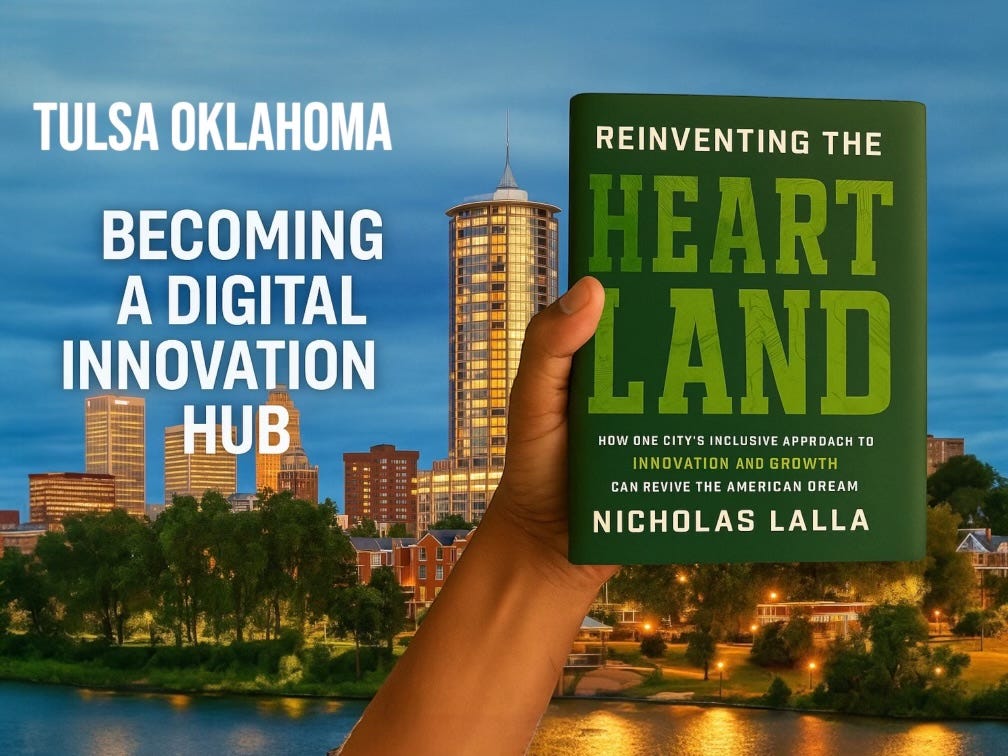The old story of Tulsa, Oklahoma, was one written in crude oil and boomtown grit—a tale of fossil fuel fortune and rust-belt decay.
But Nicholas Lalla’s new book, Reinventing the Heartland: How One City’s Inclusive Approach to Innovation and Growth Can Revive the American Dream, offers a new chapter, one that reimagines the middle of America as the epicenter of innovation, driven not by Silicon Valley billionaires but by community-rooted visionaries and overlooked assets hiding in plain sight.
Lalla, who founded Tulsa Innovation Labs (TIL) in January 2020, embarked on a bold mission to transform Tulsa from an oil legacy city into a 21st-century tech hub. In a short span, TIL raised over $200 million, helped create thousands of new tech jobs, and catalyzed a city-wide, multi-sector movement that’s unlike anything seen before in mid-sized America. The playbook, captured in Reinventing the Heartland, is as much about mindset as it is mechanics.
Uncovering Hidden Assets: A Blueprint for Every City
When asked what sparked Tulsa’s transformation, Lalla responded: “Every city wants to be something it’s not, rather than fully owning what it already is.” The Tulsa story didn’t begin with flashy tech pixie dust or federal grants—it was fueled by curiosity along with a rigorous audit of existing, often underappreciated, regional strengths.
As the roadmap emerged, Lalla’s found an unexpected discovery, namely, a nascent value proposition in advanced air mobility where companies were testing drones to monitor pipelines.
He soon learned that agricultural outfits were using them for crop management. Nearby Oklahoma State boasted one of the top drone research centers in the country. And the Osage tribal nation had built a drone testing range just outside Tulsa. But because no one had connected these dots, TIL did—and in doing so, helped Tulsa carve out a unique, high-growth tech identity.
“That’s what every Heartland city needs to do,” Lalla emphasized. “Look beyond your city limits. Stop focusing on what you lack. Focus on what’s real, what’s yours, and amplify that.”
Inclusive Innovation: Measurable, Pragmatic, and Nonpartisan
What makes the Tulsa model extraordinary isn’t just its speed—it’s that it’s purposefully inclusive. In an age when the term “DEI” sparks political firestorms, Lalla leaned into equity but did so with precision and pragmatism.
“Inclusion can’t be aspirational fluff. It has to be measurable,” Lalla said. To that end, he and his team developed The Economy Forward Framework, a matrix of nine inclusive growth metrics tailored to mid-sized cities. This framework anchors Tulsa’s strategy in real-world impact rather than ideological abstraction.
Of course, navigating inclusion in a conservative state came with challenges. “You have to meet people where they are,” Lalla acknowledged. “Inclusion doesn’t have to mean identity politics. It can mean geography. It can mean class. At its heart, inclusive growth is about making sure as many people as possible participate in the economy.”
Nicholas Lalla
Upskilling the Underserved: Tech Pipelines, Not Ivory Towers
Tulsa’s secret sauce isn’t a fancy coding bootcamp imported from the coasts. It’s the gritty, boots-on-the-ground development of local talent, especially from communities historically excluded from tech.
Lalla made a radical choice, namely, rather than investing in K-12 education (which he admits is essential long-term), he focused TIL’s energy on people already in or near the workforce. The result? The Cyber Skills Center—a partnership with Tulsa Community College that offers scholarships in cybersecurity and analytics, serving a student body that’s over 75% people of color.
“Tech training has to evolve as fast as the tech itself,” he said. “We didn’t build rigid systems. We built flexible pipelines that can adapt to AI, to robotics, to whatever’s next.”
The Tulsa Way: Community First, Capital Second
When most people think of economic development, they think of big-ticket investors, federal dollars, or billion-dollar unicorns parachuting into town. Lalla flipped the script.
“The truth is, the engine of transformation is not federal funding. It’s community leadership,” he said. “In Tulsa, a new generation of diverse, younger leaders is stepping up. They’re questioning the old models, and they’re building something rooted in trust and shared vision.”
One of the most powerful stories in Lalla’s book Reinventing the Heartland involves the coalition-building that preceded any capital raise. “We didn’t start with money. We started with belief. We built a vision that excited people—and then the capital followed.”
Lalla’s approach blended philanthropic capital, private-sector investment, and public-sector alignment to fund Tulsa’s tech renaissance. It’s a model he says any city can adopt—if they’re willing to hustle, not wait.
The Future of Tech Hubs Isn’t Coastal—It’s Cultural
According to Lalla, the very term “tech hub” will soon be obsolete. “In ten years, every company will be a tech company,” he said. “So, a tech hub will simply mean a place that gets it—a place with the infrastructure, mindset, and community support for innovation.”
Tulsa’s bet on sectors like energy transition, health innovation, and cybersecurity is already paying off. But Lalla warns that Heartland cities have a narrow window to act. “If you’re not building innovation infrastructure today, you’re already falling behind. The race isn’t just for jobs—it’s for identity, for relevance, for the future.”
Redefining the American Dream, One City at a Time
Lalla’s long-term vision is nothing short of revolutionary. “We need to kill the idea that Silicon Valley is the only model,” he said. “We need to let go of the fantasy that one big corporate relocation will save us. And most importantly, we need to stop apologizing for being who we are.”
For Lalla, the American Dream is no longer about a white picket fence. It’s about agency. It’s about building a life of purpose and possibility in your own backyard. And that starts with civic imagination.
“My dream,” he concludes, “is for every city to become the best version of itself. That’s the real American Dream—locally rooted, globally relevant, and radically inclusive.”
With Reinventing the Heartland, Nicholas Lalla isn’t just offering another wonky urban policy guide. He’s giving America’s forgotten cities a soul map—and reminding us that the future isn’t found on the coasts. It’s being built in the bold, quiet heart of places like Tulsa.
And that should give every one of us hope.
I am a former urban journalist who has written hundreds of feature articles for publications like Comstock’s Magazine, Governing Magazine, New Geography and many others. You can support me in building this city-centric digital community by becoming a free subscriber or member supporter.
Every little bit is appreciated. Thank You!
Diamond-Michael Scot





